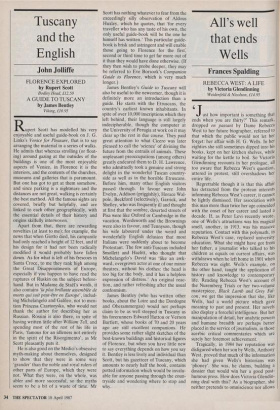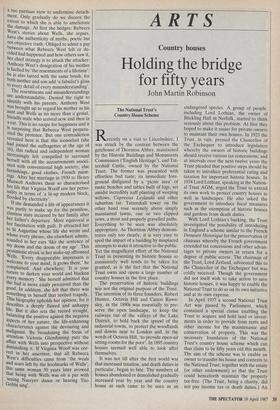All's well that ends Wells
Frances Spalding
REBECCA WEST: A LIFE by Victoria Glendinning
Weidenfeld & Nicolson, f14.95
Just how important is something that ends when you are thirty?' This remark, dropped en passant by Dame Rebecca West to her future biographer, referred to that which the public would not let her forget: her affair with H. G. Wells. In her eighties she still sometimes dipped into his books, kept on her kitchen shelves, while waiting for the kettle to boil. So Victoria Glendinning recounts in her prologue, all too aware that Rebecca West's question, uttered in protest, still overshadows her entire life.
Regrettable though it is that this affair has detracted from the protean interests informing Rebecca West's career, it cannot be lightly dismissed. Her association with this man more than twice her age coincided with the onset of her career and lasted a decade. If, as Peter Levi recently wrote, one of Wells's attractions was his magical smell, another, in 1913, was his massive reputation. Contact with this polymath, in Rebecca West's case, replaced university education. What she might have got from her father, a journalist who talked to his children as equals on current affairs, was withdrawn when he left home in 1901 when Rebecca was eight. Wells's example, on the other hand, taught the application of history and knowledge to contemporary life. Reading Rebecca West's account of the Nuremberg Trials or her two-volume masterpiece, Black Lamb and Grey Fal- con, we get the impression that she, like Wells, had a world picture which gave meaning to past and present. Her novels also display a forceful intelligence. But her manipulation of detail, her analytic powers and humane breadth are perhaps better placed in the service of journalism, in those acerbic critical commentaries which are surely her foremost achievement.
Tragically, in 1984 her reputation was disfigured when her son by Wells, Anthony West, proved that much of the information she had given Wells's historians was `phoney'. She was, he claims, building a dossier that would win her a good post- humous press. How does Victoria Glendin- ning deal with this? As a biographer, she neither pretends to omniscience nor allows a too partisan view to undermine detach- ment. Only gradually do we discern the extent to which she is able to ameliorate the damage. At first she hedges: Rebecca West's stories about Wells, she argues, have the authenticity of myths, poetic but not objective truth. Obliged to admit a gap between what Rebecca West felt or de- cided had happened and how others saw it, her chief strategy is to attack the attacker: Anthony West's denigration of his mother is fuelled by 'the resentments of a lifetime'; he is also tarred with the same brush, for both mother and son add 'a fabulist's gloss to every detail of every misunderstanding'. The resentments and misunderstandings are understandable. Denied the right to identify with his parents, Anthony West was brought up to regard his mother as his aunt and Wells as no more than a genial, friendly male who arrived now and then in a car. This is no recipe for happiness and it is surprising that Rebecca West perpetu- ated the pretence. But one contradiction revealed here is that this iconoclast (she had joined the suffragettes at the age of 16), this radical and independent woman increasingly felt compelled to surround herself with all the accoutrements associ- ated with conventional high society; chic furnishings, good clothes, French paint- ings. After her marriage in 1930 to Henry Maxwell Andrews these so characterised her life that Virginia Woolf saw her perso- nality in terms of 'a lit-up modern block, flooded by electricity'. If she demanded a life of appearances it Was partly to make up for the penniless, classless state incurred by her family after her father's departure. More equivocal is her fascination with guilt. It attracted her to St Augustine whose life she wrote and whose every phrase, she elsewhere admits, sounded in her ears 'like the sentence of my doom and the doom of my age'. This pessimistic streak in her make-up affronted Wells. 'Every disagreeable impression is welcome to your mind, it grows there,' he complained. And elsewhere: 'It is your nature to darken your world and blacken every memory.' She herself admitted that the bad is more easily perceived than the good. In addition, she felt that there was something in herself that invited tragedy. This biography upholds her opinion, for it describes a deeply flawed and unhappy life. But it also sets the record straight, balancing the positive against the negative aspects of her nature, the life-enhancing characteristics against the devouring and malignant. By broadening the focus of attention Victoria Glendinning puts the affair with Wells into perspective without diminishing it. If Virginia Woolf was cor- rect in her assertion, that all Rebecca West's difficulties came from 'the weals and scars left by the hoofmarks of Wells', this same woman 50 years later avowed that being with Wells was on a par with `seeing Nureyev dance or hearing Tito Gobbi sing'.



















































 Previous page
Previous page